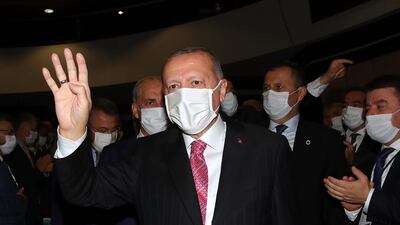A report on the Turkish government's ties to the Muslim Brotherhood has estimated that most of the Egyptian community living in the country are loyal to the movement.
The Century Foundation report said that as many 30,000 Egyptians were living in Turkey and most were being given shelter by the government of President Recep Tayyip Erdogan.
While the exact number of Egyptians in Turkey is not in official statistics, the report quoted an opposition leader in Istanbul as saying 20,000 Egyptian Muslim Brotherhood members lived on Turkish soil.
Among the high-profile members sheltering in the country was Medhat Al Haddad, who "the Egyptian government is accusing of heading the financial committee of the movement in Turkey", the report said.
Egyptians in mass departure from home after Morsi removal
The 2013 collapse of the Muslim Brotherhood government in Cairo, led by the short-lived presidency of Mohammed Morsi, spurred many Egyptians living in Turkey to leave their homeland.
The development was seized on by Mr Erdogan and his closest aides to bring his party into closer alignment with the Muslim Brotherhood, the report said.
It was written by Abdelrahman Ayyash, an Egyptian researcher in Washington.
The report detailed how Egyptian Brotherhood members received stipends to support them in Turkey, although these payments were not enough for the local cost of living.
Turkey also hosted regular conferences of the Brotherhood, including one in April 2018 in which the group's 90th anniversary was celebrated with a gathering of "Islamist leaders of different nationalities".
"Brotherhood supporters, members and officials have made it clear, through their published articles, op-eds and studies, that they are adopting policies in the Turkish model," the report said.
In Mr Ayyash's view, Brotherhood members had embraced Mr Erdogan as a "political mentor and close ally".
At the same time, the trend of "provincialisation" of the Brotherhood towards home country concerns reversed, and along with it an emphasis on internal critical thinking towards "emotional discourse".
Proliferation of Turkey's Islamist networks
While there was substantial competition between Mr Erdogan's AKP and the Muslim Brotherhood in the early part of the century, the German domestic intelligence service was highlighting the Turkish government's Islamist networks as early as 2005.
That year the 2005 annual report on the protection of the constitution shone a spotlight on the role of Turkish-backed organisations in the country.
"Their wide range of Islamist-oriented educational and support activities, especially for children and adolescents from immigrant families, are used to promote the creation and proliferation of an Islamist milieu in Germany," it said.
Since then the melding of the AKP with the Muslim Brotherhood had transformed Turkey's position in the world, as it lost enthusiasm for joining the EU and became detached from its alliance with the US and Nato.
One of Mr Erdogan's closest allies, Yasin Aktay, a former AKP deputy chairman, has said the Muslim Brotherhood is a tool of state power.
“The Muslim Brotherhood represents Turkey’s soft power,” Mr Aktay said.
The Brotherhood is listed as terror organisation in the UAE and other countries.
After the failed coup attempt against Mr Erdogan in 2016, the report said he had used Egypt as a "scarecrow" to suppress his opponents, including dissidents in his own movement.


